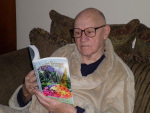Pat Bertram's Blog, page 269
June 3, 2012
The Cloth of Sloth
 We live in a strange society where the names of clothing matter more than the yardage used to create the garments. We don’t wear “underwear” out in public, not even if it is made of thick cotton and covers most of our torsos, but call something a “swimsuit” and no matter if it barely covers the salient issues, it is acceptable. (Well, maybe not acceptable in church, but depending on where you live, it could be acceptable almost everywhere else.)
We live in a strange society where the names of clothing matter more than the yardage used to create the garments. We don’t wear “underwear” out in public, not even if it is made of thick cotton and covers most of our torsos, but call something a “swimsuit” and no matter if it barely covers the salient issues, it is acceptable. (Well, maybe not acceptable in church, but depending on where you live, it could be acceptable almost everywhere else.)
If you live in the United States and you wear something called “pajamas,” which used to be the standard of clothing in certain countries and which covers you neck-to-ankle, that is not acceptable. But if you wear tiny shorts and an even tinier crop top, that is acceptable. There are all sorts of wonderful pajamas on the market now that are made of soft cotton and look like jeans and a casual shirt, but if you wear the clothing out in public, that is so not acceptable. In fact, I’ve lost count of the number of blogs I’ve read where bloggers turn up their nose at those who dare to be comfortable and wear such clothing anywhere but in the privacy of their own bedrooms.
If you wear a “slip,” that is not acceptable, even though many cocktail dresses are created using that same basic pattern. But if you wear skintight clothing that leaves absolutely nothing to the imagination, well, that is acceptable to most people, though if you aren’t as thin as a model, you do run the risk of having people look askance at you.
The same double standard goes for footwear. If you wear slippers out in public, even the kind that cover your whole foot, you are considered slovenly, but flip-flops and even bare feet are acceptable.
And worst of all is if you were to wear your bathrobe outside!! Think of it. You’re in a grocery story line and you see someone in a soft fleecy robe belted over clothes, what do you do? You edge away from her, wondering if she is in his right mind. And if she is wearing pajamas beneath the robe, oh, my. How terrible. But why is it terrible? Simply because of the name of the garments.
In “The Time for Bathrobes,” Barbara Holland wrote: “America has never been a nation of bathrobe wearers. If the mailman catches us in our bathrobes, we mumble and blush. It has nothing to do with modesty. It is the shame of being thought inactive. Bathrobe’s the cloth of sloth.”
Little by little, my solitary life is beginning to nudge my consciousness out of its established groove, and ironies such as those I mentioned here seem to stand out in high relief. Perhaps I’m spending too much time in my own head? I’ll be careful, though, and not go to the store in my bathrobe. I wouldn’t want to get arrested for decent exposure.
Tagged: Barbara Holland, bathrobe, cloth of sloth, pajamas, underwear vs swimsuit, wearing pajamas outside








June 2, 2012
The point of writing is simply . . . writing
The book statistics continue to dishearten me. A recent study of 1,007 self-published authors shows that romance authors earned 170% more than the average, while science-fiction writers earned 38% of the average, fantasy writers 32%, and literary fiction authors just 20%. Even though I’m not self-published, these figures matter because they show the trend. Most of the books that are selling are romances, and most of the selling romances are written by well-educated women in their forties. Typically, 75% of the total sales were made by 10% of the authors.
That’s good news for women who write romances, but what about the rest of us? I don’t want to write to make money — I want to make money from what I write, which is something completely different. Considering that my books are genre-benders and that most readers seem to stick with recognizable genres and story lines, it’s not surprising that my books are slow sellers. Even if I wanted to write to sell, I’m not sure I could. Chances are, if I were to start out writing a romance, it would end up being something completely different after I filtered it through my writing voice. (Whatever voice that might be.) We can only write the books that are in us. And romance novels are nothing I have any interest in, either to read or to write.
 Oddly, despite what I see as a dismal book climate, I am getting interested in writing again. My work-in-pause — a tongue in cheek apocalyptic novel — is so far out of the realm of any recognizable genre that it would probably be impossible to sell. (Even my father admits that it’s weird, and he likes my books.). But I’ve concluded that selling isn’t the point of writing, at least not for me. Nor is communicating with others. (That’s what this blog is for — to communicate with others.) The point of writing is simply . . . writing. Using my brain. Creating a world that didn’t exist before. (Could that be the point of life? The creation of a world that didn’t exist before? Hmmm. I wonder if there’s a book in that idea.)
Oddly, despite what I see as a dismal book climate, I am getting interested in writing again. My work-in-pause — a tongue in cheek apocalyptic novel — is so far out of the realm of any recognizable genre that it would probably be impossible to sell. (Even my father admits that it’s weird, and he likes my books.). But I’ve concluded that selling isn’t the point of writing, at least not for me. Nor is communicating with others. (That’s what this blog is for — to communicate with others.) The point of writing is simply . . . writing. Using my brain. Creating a world that didn’t exist before. (Could that be the point of life? The creation of a world that didn’t exist before? Hmmm. I wonder if there’s a book in that idea.)
I suppose my renewed interest in writing is inevitable. I’ve been spending less time online and more time in the real world. And for me, writing takes place in the real world. Or at least the real world of my mind.
Tagged: romance writers, self-published authors, the point of writing, work in pause, writing what is in us








June 1, 2012
Great Reviews for Light Bringer
I got a great review for Light Bringer yesterday from S.M Senden. “Pat Bertram has woven a wonderful story that weaves together imagination with history, science fiction, love, power and so much more, and it works so well. If you are looking for a good story, well written, then read this book. I hope you will love it as much as I did!”
I am thrilled when readers love any of my books, but especially Light Bringer.
First, it is very difficult to classify, even for reviewers. As Aaron Lazar wrote, “Light Bringer is something completely new and surprising . . . surprising in its freshness, originality, its genre bending brilliance. Part thriller, part fantasy, part sci fi, part mystery . . . its plots were large and complex, encompassing themes that plague us every day; offering social and world commentary blended with weather trend observations (where ARE all those tornadoes and tsunamis coming from??) I do believe Bertram has defined a new genre, and it is a pure delight. Fresh. Original. Riveting. The characters are real and engaging.”
Second, it is the result of twenty years of research into conspiracy theories and myth. Many researchers have traced the drive toward a one-world government conspiracy back 7000 years. Others believe that the black death was a man-made epidemic, created in an effort to “dumb down” the inhabitants of Earth. (William Bramley, author of Gods of Eden, wrote: “Strange men in black, demons, and other terrifying figures were observed in other European communities carrying ‘brooms’ or ‘scythes’ or ‘swords’ that were used to sweep or knock at people’s doors. The inhabitants of these houses fell ill with plague afterwards. It is from these reports that people created the popular image of death as a skeleton, a demon, a man in a black robe carrying a scythe.” This is the origin of the grim reaper) In fact, myths all over the world speak of the gods giving and the gods taking away. According to the Popul Vuh, the gods created the first humans exactly like the gods themselves. Displeased that the simple creatures of their making were also gods, the creators took some of the god-like abilities away from them, and we are the result. And from all that research came the idea for Light Bringer.
Third, the lyricism of the book seems to bring out a corresponding lyricism in reviewers. Sheila Deeth called Light Bringer “mysteriously beautiful and musical,” and then added, “Pat Bertram’s novel soars in her descriptions of mystery and scenery. The song of the rainbow flows through the characters, binding them together, while the silence of the great unknown drives them and pulls them apart.” Tracy Fabre wrote, “This novel is color and sound and more color, described as it’s never been described before. Part sci-fi, part small town life, part intrigue, part romance, part rainbow explosion, this is a tale of two people who are not like other people yet end up in a little out-of-the-way community where a lot of strange things have happened and continue to happen. It’s a multi-layered story she should be very proud of, and incidentally will make you crave muffins. Consider yourself warned.”
***
 Light Bringer: Becka Johnson had been abandoned on the doorstep of a remote cabin in Chalcedony, Colorado when she was a baby. Now, thirty-seven years later, she has returned to Chalcedony to discover her identity, but she only finds more questions. Who has been looking for her all those years? Why are those same people interested in fellow newcomer Philip Hansen? Who is Philip, and why does her body sing in harmony with his? And what do either of them have to do with a shadow corporation that once operated a secret underground installation in the area?
Light Bringer: Becka Johnson had been abandoned on the doorstep of a remote cabin in Chalcedony, Colorado when she was a baby. Now, thirty-seven years later, she has returned to Chalcedony to discover her identity, but she only finds more questions. Who has been looking for her all those years? Why are those same people interested in fellow newcomer Philip Hansen? Who is Philip, and why does her body sing in harmony with his? And what do either of them have to do with a shadow corporation that once operated a secret underground installation in the area?
Click here to read the first chapter of Light Bringer by Pat Bertram
Click here to buy Light Bringer from Second Wind Publishing, LLC
Click here to download 20% free at Smashwords or to buy any ebook format, including Kindle.
(Also available from Amazon and B&N)
Tagged: conspiracy theories and myth, dumbing down, Light Bringer, Light Bringer review, origin of the grim reaper








May 31, 2012
Learning to Deal With the Real World
 It seems strange to have to learn to deal with the real world at my age, but for more than half of my life, I didn’t have to deal with the world as it is. My life mate/soul mate and I created our own world of peace and accord. We always wanted the best for each other without ever a hint of envy or resentment. We helped each other. We listened to each other. We cared for each other and took care of each other. We shared values, income, responsibilities without counting the cost or worrying about who got more than their share. In fact, we often worried that we were taking more than we gave.
It seems strange to have to learn to deal with the real world at my age, but for more than half of my life, I didn’t have to deal with the world as it is. My life mate/soul mate and I created our own world of peace and accord. We always wanted the best for each other without ever a hint of envy or resentment. We helped each other. We listened to each other. We cared for each other and took care of each other. We shared values, income, responsibilities without counting the cost or worrying about who got more than their share. In fact, we often worried that we were taking more than we gave.
It wasn’t like that at the end, of course. Long-term illness skews things, so during his last years, there was often tension and frustration as our lives started to diverge — he to death, me to life alone. We could feel the disruption of our world, and though we were under tremendous stress and occasionally gave in to fits of pettiness, we mostly managed to deal peaceably with each other. To others, however, we appeared to be in perfect accord. During one of their visits, the hospice nurse turned to the social worker and said, “I don’t think they have any idea how much they love each other.”
What we had didn’t feel like love, and yet, what else could it be, this creation of a world where we each gave whatever we could without stopping to count the cost? We didn’t have an easy time of it — so often life took disastrous turns, but still, we were always there for each other.
And now we’re not.
He’s . . . somewhere (or nowhere) and I? I’m here, muddling along as best as I can in this alien world. The world is alien in part because his absence has created a black hole into which so much light has disappeared; in part because I am alone without someone listening, caring, helping; in part because it truly is alien. Though people often say, “We’re all in this world together,” they don’t mean it. People want things and they pursue those things with a passion. Isn’t that what most people think life is about? Finding someone or something to be passionate about? But here is the conundrum — passion takes what it wants and doesn’t count the cost to others. (That is why passion is such a great story driver.)
He and I used to play games where the goal was not to win or lose, but to come out evenly matched. We hated games where one person won everything and the other lost everything. It seemed too cruel. Neither of us wanted to lose, but we didn’t want the other to lose, either, because we knew how much losing hurt. (It probably won’t come as any surprise if I tell you we created our own games.)
We never argued. Well, there was that once, six weeks before he died, but I hate thinking of that. I understand now the horrendous pressure of our lives, but for so long all I could think of was how horrible I was for having my first fight with my mate six weeks before his death. (I understand it now, but I still can’t think of it without tearing up. I never wanted to be that woman.) But for more than three decades, if we disagreed, he’d state his position and I’d state mine (or vice versa). If we couldn’t come to a resolution, we’d walk away (sometimes in a huff, sometimes in frustration). The next day, he’d bring up the subject again, conceding that I was right. Of course, by then I’d have mulled over what he said, and I’d concede that he was right. So we were back where we started. The best thing about it is I knew he’d thought about what I said, he hadn’t just blown me off by walking away.
When he died, my world of accord died, too, and now I live in the world everyone else does — a world where some have way too much and some have way too little. A world where passions tear people apart as often as they bring them together. A world where competition is rampant, where it’s not enough just to win, but also to make sure others lose. A world where small disagreements escalate into battles. Admittedly, this is what the world has always been like, but I didn’t have to deal with it.
And now I do.
Tagged: counting the cost, dealing with the real world, grief and loss, long-term illness, passion takes what it wants, we're all in this together








May 30, 2012
The Energy that Powers a Story and Drives it Forward
 Narrative drive is the energy of a story, the force that propels it forward, the promise that something important is going to happen. You create a strong narrative drive with a focused story goal, strong characters, and the questions you raise in readers’ minds.
Narrative drive is the energy of a story, the force that propels it forward, the promise that something important is going to happen. You create a strong narrative drive with a focused story goal, strong characters, and the questions you raise in readers’ minds.
For example, in the beginning of my novel More Deaths Than One, Bob Stark is reading that day’s newspaper when he comes across the obituary of his mother, who he had buried twenty years before. This scene generates so many questions that it should be impossible for readers to put the book down until they get the answers to at least a few of the questions. Is the obituary a hoax? If not, how could his mother have died twice? What is Bob going to do? How is he going to find out the truth? How would I react if this happened to me?
When Bob goes to the cemetery to check it out, he sees himself (or rather, a man who looks exactly like him) standing by the open grave with his college sweetheart and a passel of children, which raises the granddaddy of all questions — what the hell is going on? Bob wants to know, and so do readers. (At least that’s the way it’s supposed to work.)
I began Daughter Am I with a question. “Who were James Angus Stuart and Regina DeBrizzi Stuart?” Mary asked, trying to ignore the mounted heads of murdered animals staring down at her from the lawyer’s wood-paneled walls. Even though that question is the theme of the book (and “murder” a foreshadowing of events to come) and hopefully will be the question that readers want to know, just voicing the question out of the blue like that is nothing to drive the story. But, as the chapter continues, and we find out that James and Regina are Mary’s grandparents who were recently murdered, leaving her their farm, and that her father claimed they were dead — Now that raises questions. Who were James and Regina, and what did they do that was so horrible their son disowned them?
By the time a few of these questions are answered, if I did my job correctly, I will have raised more questions to which readers will want the answer, and so the story is propelled forward to a satisfying ending.
If the story goal isn’t focused enough, if the characters are weak, the questions the story raises in readers’ minds falls under the heading of “who cares?” Why am I reading this? Why isn’t anyone doing anything to resolve the problem? When is something going to happen? Not questions you want readers to ponder!
What about you? What propels your story forward? What questions does your story (ideally) raise in readers’ minds?
Tagged: driving a story, narrative drive, raising questions in readers minds

May 29, 2012
It Was a Dark and Stormy Night
 I have to write a short story for Second Helpings, an anthology to be released later this year from Second Wind Publishing, and I’m trying to come up with a witty or evocative first line, something that will immediately catapult me into a story, but all I can think of is Billy Crystal in Throw Mama From the Train. I remember watching him struggle for the perfect first line, the perfect word until I wanted to scream “Skip the first line! Start anywhere! Or use a thesaurus.” But that was before I started to write, and now I find myself doing the same thing.
I have to write a short story for Second Helpings, an anthology to be released later this year from Second Wind Publishing, and I’m trying to come up with a witty or evocative first line, something that will immediately catapult me into a story, but all I can think of is Billy Crystal in Throw Mama From the Train. I remember watching him struggle for the perfect first line, the perfect word until I wanted to scream “Skip the first line! Start anywhere! Or use a thesaurus.” But that was before I started to write, and now I find myself doing the same thing.
Odd that first lines are so important, yet few set the mood or do anything else they’re supposed to. And fewer still are memorable. Probably the best known line is “It was a dark and stormy night,” but it’s also considered to be the worst first line in history, mostly because of what comes after the initial phrase. The entire first sentence by Edward Bulwer-Lytton for his novel Paul Clifford is: It was a dark and stormy night; the rain fell in torrents — except at occasional intervals, when it was checked by a violent gust of wind which swept up the streets (for it is in London that our scene lies), rattling along the housetops, and fiercely agitating the scanty flame of the lamps that struggled against the darkness. That sure is an eyeful!
As it turns out, Bulwer-Lytton was not the first to use “It was a dark and stormy night.” Washington Irving used the phrase twenty years earlier on page 282 of The History of New York.
Still, memorable or not, plagiarism or not, I stole the line for a short story I wrote for Murder in the Wind, a previous Second Wind anthology. Here’s how my story “The Stygian Night” began:
***
It was a dark and stormy night.
Silas Slovotsky leaned back in his chair and studied the words he’d typed into his computer.
He grinned. Perfect. The very words he needed to set the scene. And they had the added benefit of being true. It was a dark and stormy night. Except for his porch light, of course. And the thunder and lightning—
He leaned forward and peered at the computer screen. Did the sentence seem a bit trite? Maybe he needed to spiffy it up. He opened his thesaurus to the word “dark” and ran a finger down the page. “Stygian”. That might work.
He cleared his computer screen and typed: It was a stygian night.
Nope. Didn’t have the euphoniousness of the original sentence. Perhaps if he reread what he’d already written he could figure out how to proceed.
He printed out the manuscript he’d been working on for the past four months and read the single page. Dark as Night by Jack Kemp.
A thrill ran up his spine. He could see it on the shelf in the bookstore. Kemp, King, Koontz. He’d chosen his pseudonym specifically so the reviewers could call them the unhallowed trinity. And he deserved the accolade.
A knock on the door startled him out of his dream.
Who could that be? His friends—all two of them—knew he didn’t like to be disturbed when he was writing.
***
I loved that story. So out of character for me! And I loved my story for the latest anthology. Apparently, although I dig in my heels and scream (silently), “I don’t wanna!” I do enjoy my short stories.
How about this for a first line? As the ax descended toward her head, the young mother struggled in vain to free her hands from the nylon rope. It might work if I took out “in vain” because headless characters are hard to write about, but come to think of it, Washington Irving managed to do it. He wrote about a headless horseman.
But this is supposed to be a holiday story. Thanksgiving, Chanukah, Christmas, New Years. And it has to involve food because a recipe will accompany each story. It seems as if I am far from a festive mood — all I can think of is poisoned cookies. Maybe someone left poisoned cookies for Santa? Or gave them to a neighbor who always went overboard with the Christmas lights, making it impossible to sleep? Or couldn’t bear one more holiday dinner with her overbearing brother-in-law?
Perhaps not, but still . . . murder, mayhem, and family get-togethers somehow seem to go together.
What about one of these for a first line? Now is the winter of our discontent, or It was the best of times, it was the worst of times. Maybe for another Silas Slovotsky story?
Hey! Why should I have all the fun? You can write your own holiday story (any genre) and maybe you will be published in the same anthology. Rules for the contest are here: Invitation to Submit an Entry to Our Short Story Contest.
Tagged: first lines, holiday short stories, It was a dark and stormy night, Throw Mama From the Train, Washington Irving, writing a short story

May 28, 2012
Conflict Opens a Door and a Story Begins
 Sometimes it seems as if most books and movies today are glorified comic books, epic battles between the dubiously good and the impossibly evil. Conflicts in which there are no shades of gray must be satisfying for many people, but I like a little more subtlety in my conflicts, a little more reality.
Sometimes it seems as if most books and movies today are glorified comic books, epic battles between the dubiously good and the impossibly evil. Conflicts in which there are no shades of gray must be satisfying for many people, but I like a little more subtlety in my conflicts, a little more reality.
In a world that is run by major corporations, stories where a lone hero takes on a megalithic corporation, brings down the owner of the company, and saves the world just are not plausible. Though I’m sure presidents of the major corporations think they are indispensable, they are not. If they are eliminated, there will always be others to take their place, and the corporations will go on doing whatever it is that they do.
Because I know this and cannot escape it even in a world of my own creation, conflicts in my books tend to be less clearly defined. Of course I have heroes and villains, but the villains are not always dastardly ones, though my other characters may perceive them as such. The villains are the heroes of their own story, and though a corporation is often the villains’ vehicle, my heroes don’t bring it down.
I like my heroes to find a romantic partner, a co-protagonist. It seems to dissipate the energy of the story if the two are always in conflict, so I prefer it when they bond together in their struggle against fate (or an employee of a corporation as the personification of fate). To me, the biggest villain around is fate. What is more unfair, more murderous, more disastrous than fate?
My heroes never bring on their fate. Perhaps my books would be more dramatic if they did, but I cannot sympathize with characters who cause their own problems. And why do they have to cause problems for themselves when other people or even life itself is always ready to cause problems for them?
When fate comes knocking on the door, everything changes. And that’s when a real story, not a comic book, begins.
In my novel Light Bringer, “fate knocking at the door” is a one of the unintended themes. In the prologue, baby Rena is found at the door of a remote Colorado cabin. In the first chapter, fate comes with an actual knock when men proclaiming to be NSA agents show up at Philip Hansen’s door. Fate finds Jane Keeler when she shows up at her sister’s door and finds the house empty. Fate knocks even harder when she opens the door of a local coffee shop and meets the man of her dreams, and poor Jane’s fate is sealed when she is abducted and shoved through the door of car.
So many doors! Philip knocks on Rena’s door, and later the two are carried uncocnscious through the door to an underground facility, where Jane is also being held behind a locked door. Philip and Rena find out that between them they can open doors without a key, and when they do, they find secrets behind even more doors. And then there is the ghost cat Wisdom and the invisible watcher who seem to need no doors, but are more than willing to open them for Philip and Rena. Each time a character goes through a door, things change, and they find more conflict.
Fate doesn’t have to come with an actual knock, but it’s been said there are only two stories — a character goes on a trip and a stranger knocks on the door, so doors are an important symbol of conflict and change.
How do doors enter into your story?
Tagged: a stranger knocks on a door, conflict, creating conflict, doors as a symbol of change, fate knocking on door, there are only two stories

May 27, 2012
Two Years and Two Months of Grief
 I never expected to feel so sad two years and two months after the death of my life mate/soul mate, and I never expected to still be so easily brought to tears. But then, I never expected most of what I’ve experienced with grief, especially since I tend to be more contemplative and stoic than emotional. As I’ve learned, though, grief might manifest as emotion, but it is so much more than that — it’s a restructuring of the world as we know it, a reconfiguring of reality. And that takes a lot of energy, both mental and physical. And it takes time. A person who was a major part of our life is gone, ripping a hole in our reality, and our brains are struggling to patch the hole (or at least to figure a way around it), which causes an incredible amount of stress.
I never expected to feel so sad two years and two months after the death of my life mate/soul mate, and I never expected to still be so easily brought to tears. But then, I never expected most of what I’ve experienced with grief, especially since I tend to be more contemplative and stoic than emotional. As I’ve learned, though, grief might manifest as emotion, but it is so much more than that — it’s a restructuring of the world as we know it, a reconfiguring of reality. And that takes a lot of energy, both mental and physical. And it takes time. A person who was a major part of our life is gone, ripping a hole in our reality, and our brains are struggling to patch the hole (or at least to figure a way around it), which causes an incredible amount of stress.
Part of that restructuring is a new consciousness of death. We all know we are going to die, but after the death of someone we are profoundly connected with, we KNOW deep within our psyches. This knowledge makes life on Earth seem at once more significant and less vital (or do I mean more vital and less significant?), which is why so many of us bereft struggle for meaning. Some of us will eventually settle back into every day life, but for the rest of us, life will always seem a bit off, as if a part of us knows we are aliens in an alien land.
Mostly, I’m doing okay. If we were to meet, you’d have no idea of my ongoing sadness. I don’t try to hide it, it’s just that the sadness has become such a part of me that it doesn’t impede my living. I can smile and laugh and chat as if everything were fine, and it is, for that moment. But when I am alone and not focused on a task, sorrow percolates to the surface. Sometimes our life together seems very far away, as if it were only a dream born of loneliness, but this ongoing sadness reminds me of the truth — I once was with someone I loved deeply, and now I’m not.
I never feel his presence, but his absence hovers beside me as if it were a living thing. When I make a salad, I am aware that he is not washing the vegetables for me. When I am at the grocery store, I am aware that he is not helping pick out what we need. When I am exercising, I am aware he is not in the room. When I need someone to talk to, I am aware he cannot respond. When I watch one of his many video tapes, I am aware he is not sitting next to me. Every time I use something of ours, even something as inconsequential as a spoon, I am aware that he has no need of the article.
I don’t purposely think of such things. In fact, the awareness is not a thought. It’s just that everything I do and everything I own echoes with his absence. Maybe someday even the echo will die away and all I’ll have of our shared life are fading memories. But no matter how I feel or what I forget, I’ll always be grateful that an extraordinary man shared his life with me.
Tagged: consciousness of death, coping with grief, grief and loss, grief at two years, stress of grief

May 26, 2012
Have You Ever Wondered How Amazon’s Algorithms Work?
Amazon has always mystified me, not just how they rank books but how some people who seldom promote manage to sell thousands of copies of their books, and others who seem to promote just as much languish at the bottom of the sales ranks. Today I learned two things.
1) A study done at Harvard Business School shows that Amazon customer reviews have as much weight as professional reviews. Other studies have shown that the number of reviews makes a difference, not just the rankings. In other words, any review helps, even low starred ones since readers tend to discount the five star ratings, especially if all the ratings are five star.
2) Amazon has two lists, a bestsellers list and a popularity list. The bestseller list reflects the number of sales in the past 24 hours, while the popularity list reflects the number of sales plus the price of the book for the past 30 days. Which is why giving away books might put you high on the bestseller lists but keep you off the popularity lists. Being high on the popularity lists can account for thirty to forty book sales a day. (You can find the entire article here: Updates to Amazon’s Book Ranking Algorithms: The Death of 99-Cent Ebooks? An End to KDP Select Perks?)
I still haven’t learned how to get on the lists, though. Obviously, selling a ton books helps, but that skill eludes me.
[Thanks to Christine Husom, fellow Second Wind author, for providing both the link and the information about the Harvard Business School Study.]
Tagged: Amazon book ranking, Amazon sales rankings, Amazon's alogrithms, importance of book review

May 25, 2012
How To Do an Online Interview
 I have a couple of blogs where I promote other authors, and so few authors follow the directions, I’ve become convinced writers have no idea how to read. Or perhaps they believe the directions don’t apply to them? Even so, bloggers cannot post what they do not have. So, for all you authors out there who are promoting your books, if you wish to be a guest on someone else’s blog, please follow the bloggers’ directions. The directions are there for a reason, partly to make it easier for the blogger, but mostly to make the interview or guest post as pleasing and compelling as possible to attract readers for your books.
I have a couple of blogs where I promote other authors, and so few authors follow the directions, I’ve become convinced writers have no idea how to read. Or perhaps they believe the directions don’t apply to them? Even so, bloggers cannot post what they do not have. So, for all you authors out there who are promoting your books, if you wish to be a guest on someone else’s blog, please follow the bloggers’ directions. The directions are there for a reason, partly to make it easier for the blogger, but mostly to make the interview or guest post as pleasing and compelling as possible to attract readers for your books.
If bloggers ask for a link to your book cover, please provide one. You have posted your book cover somewhere on the internet, right? So, provide that link. (For example, I have posted all of my book covers on the right sidebar of this blog and on my website, so I could provide either link.) If bloggers are going out of their way to promote you and your book, don’t make it harder by making them search for a photo or a link because generally, they won’t take the time. And, as I said, bloggers cannot post what they do not have.
If the blogger gives you an option where you can choose from a list of questions, please choose questions to which you can give full answers. Responding, “I don’t know” to a question is a waste of your time, the blogger’s time, and the reader’s time. If you don’t know, pick a question to which you do know the answer. Giving monosyllabic responses is just as bad. You’re a writer, right? Supposedly you know how to hook readers. So hook them. Tell them something interesting. Most writers say they have no message in their books, that they just want to entertain, so be entertaining.
Almost as bad as “I don’t know” is saying “It’s difficult to describe.” You’re a writer. Take the time to find the necessary words. And please, do not respond to a question with, “You’ll have to read the book.” There are 130,000,000 published book as of this very moment, so people have plenty of options. They don’t have to read your book. You have to make them want to read your book.
For my Author Questionnaire, I begin with the question, “What is your book about?” It’s the hook, the reason why we are all at the blog — to know about your book. So, please, don’t start your interview with boring questions like, “Is this your first book?” Why would the reader care if it’s your first book if they don’t know what it is about? And please give the title of your book. If you’ve done your job right, people are going to want to learn more about your book, but if you haven’t provided a title, how will readers know what it is?
Proof your interview or guest post. If your interview is full of typos, people will assume that your book is full of typos. If your grammar is sadly lacking, people will assume your book is as ungrammatical. And if your interview is boring, people will assume your book is also boring. So please, spend time on your presentations. It does you no good to carelessly throw together an interview, guest post, or excerpt, and expect readers to instantly fall in love with you and your work.
But most of all, follow the directions. I ask people to submit their interview as a comment reply on the blog, yet every day I get a message from someone asking for my email address so they can send me their interview. Um. No. If I wanted it sent via email, I would have provided the address.
Only about 10% of the people who do interviews for me provide everything I ask, which is why I am writing this blog. It’s a way of getting rid of my frustration and at the same time remind people to FOLLOW DIRECTIONS!
(If I haven’t scared you off, click here to find the directions for my Author Questionnaire.
Click here to find the directions for my Character Questionnaire.
And click here to Let me post your excerpt!)
Tagged: author interviews, book promotion, follow directions, how to do a blog interview, how to do a guest post, online interview











